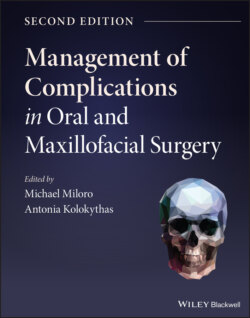Читать книгу Management of Complications in Oral and Maxillofacial Surgery - Группа авторов - Страница 27
NEUROLOGICAL COMPLICATIONS Syncope
ОглавлениеSyncope, one of the most common anesthetic complications, typically occurs in the preoperative setting, but may be observed occasionally postoperatively as well (Algorithms 1.1, 1.2). Syncope is defined as transient loss of consciousness with spontaneous return to consciousness. In a study by D'Eramo, syncope was the most frequently observed complication, occurring in 1 out of 240 parenteral sedation cases and 1 out of 521 general anesthetic cases [1]. It is usually related to patient's anxiety in the preoperative setting and is most frequently observed upon venipuncture for placement of an IV line [16]. Syncope responds well to placing the patient in the Trendelenburg position, as this places the patient's head lower than the thoracic cavity and speeds blood return to the brain. Supplemental oxygen is beneficial and should always be given; it is also useful in cases of near‐syncope. Ammonia smelling salts may also be helpful and are usually applied in situations where Trendelenburg positioning and supplemental oxygen do not result in a rapid return to consciousness.
In the postoperative period, patients may experience syncope due to vasovagal response or transient orthostatic hypotension when rising too quickly from a seated or supine position. This complication may be prevented by assisting all patients when they stand or begin walking, since syncope under these circumstances carries the additional risk of injury from falling. Management consists of patient positioning, supplemental oxygen, and ammonia salts if needed.
Any period of unexpected patient unconsciousness that lasts for several minutes is not considered true syncope. If a loss of consciousness episode lasts more than a few minutes, other causes should be investigated without delay, including the possibility of hypoglycemia, hypotension, dehydration, partial seizure, oversedation, or cerebrovascular accident.
